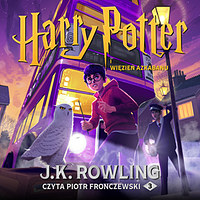You need to sign in or sign up before continuing.
Take a photo of a barcode or cover
adventurous
"Ask, and it will be given to you; seek, and you will find; knock, and it will be opened to you."
HP1 is about discovery. HP2 is about fear. HP3 is about... Quidditch.
Well, not Quidditch exactly, but Seeking. And not so much seeking as finding: Finding the truth of his parents' betrayal. Finding his parents' friends still among him. Finding his fears, and how to face and overcome them.
Finding that the only way to reconcile fear with discovery, and thus the fear of what you might find, is by wrestling with your identity. But since Harry's identity is so intertwined with what has happened to him in the past, really it is time itself he must contend with. And once more JK Rowling showcases her penchant for introducing the right objects at the right time in order to achieve a thematic feat, here with the Marauders Map and the Time Turner.
In this same way Quidditch is such an appropriate backdrop to this book. (JK dedicates more attention to the sport in HP3 than any other book.) Harry is naturally good at it, maybe even the best, yet this time there is actually a real challenge for him there: the dementors, who serve as a conduit for Harry's fear (hearing his mother's dying voice). But the real "game" rests in the fact that this fear is not a true fear as much as it is a shameful yearning, a sort of confrontation with the Jungian shadow. So once again, Harry is left with a *choice* to either let that shadow consume him, or to integrate it by choosing to fight it head on. He chooses the latter, and it is Lupin--a representative from his yet unknown past--who helps him succeed.
By the end of the book it's clear that the past lives in both the present and the future, and it must be dealt with properly. It's 'Time Turner Harry' who saves himself and his friends from the dementors, with the help of another instantiation of the past, his Patronus. TT-Harry saves Sirius Black, thus setting the wrongs of the past right (and free). Despite these successes, there's a version of the past that escapes... and this small, undealt-with creature is what creates the potential for Voldemort's eventual return in the future.
But more on that later. For now, the intro trilogy is complete. In HP1, Harry discovers his internal strength. In HP2, he discovers his external strength. In HP3, Harry fully confronts the past, full of his fears but also his potential, and uses it to synthesize his internal and external strengths. Self-actualization achieved.
In many ways, these exact themes will repeat again in Books 5-7, but that's okay, because Harry, the perennial Seeker, is meant to catch the Snitch.
HP1 is about discovery. HP2 is about fear. HP3 is about... Quidditch.
Well, not Quidditch exactly, but Seeking. And not so much seeking as finding: Finding the truth of his parents' betrayal. Finding his parents' friends still among him. Finding his fears, and how to face and overcome them.
Finding that the only way to reconcile fear with discovery, and thus the fear of what you might find, is by wrestling with your identity. But since Harry's identity is so intertwined with what has happened to him in the past, really it is time itself he must contend with. And once more JK Rowling showcases her penchant for introducing the right objects at the right time in order to achieve a thematic feat, here with the Marauders Map and the Time Turner.
In this same way Quidditch is such an appropriate backdrop to this book. (JK dedicates more attention to the sport in HP3 than any other book.) Harry is naturally good at it, maybe even the best, yet this time there is actually a real challenge for him there: the dementors, who serve as a conduit for Harry's fear (hearing his mother's dying voice). But the real "game" rests in the fact that this fear is not a true fear as much as it is a shameful yearning, a sort of confrontation with the Jungian shadow. So once again, Harry is left with a *choice* to either let that shadow consume him, or to integrate it by choosing to fight it head on. He chooses the latter, and it is Lupin--a representative from his yet unknown past--who helps him succeed.
By the end of the book it's clear that the past lives in both the present and the future, and it must be dealt with properly. It's 'Time Turner Harry' who saves himself and his friends from the dementors, with the help of another instantiation of the past, his Patronus. TT-Harry saves Sirius Black, thus setting the wrongs of the past right (and free). Despite these successes, there's a version of the past that escapes... and this small, undealt-with creature is what creates the potential for Voldemort's eventual return in the future.
But more on that later. For now, the intro trilogy is complete. In HP1, Harry discovers his internal strength. In HP2, he discovers his external strength. In HP3, Harry fully confronts the past, full of his fears but also his potential, and uses it to synthesize his internal and external strengths. Self-actualization achieved.
In many ways, these exact themes will repeat again in Books 5-7, but that's okay, because Harry, the perennial Seeker, is meant to catch the Snitch.
i'm making my way through the whole harry potter series, & this book is so much better than i remember. loved the remus lupin & sirus black dialogue at the end too :)
adventurous
mysterious
tense
fast-paced
adventurous
medium-paced
Plot or Character Driven:
Plot
Strong character development:
Complicated
Loveable characters:
Yes
Diverse cast of characters:
No
Flaws of characters a main focus:
N/A
adventurous
dark
mysterious
fast-paced
Plot or Character Driven:
Plot
Strong character development:
Yes
Loveable characters:
Yes
Diverse cast of characters:
Complicated
Flaws of characters a main focus:
Complicated
“You think the dead we loved ever truly leave us? You think that we don’t recall them more clearly than ever in times of great trouble? Your father is alive in you, Harry, and shows himself plainly when you have need of him.”
adventurous
mysterious
medium-paced




